Groups Want Reporters to Pay to Cover Whole Event
House Votes to Cut Public Broadcasting Funds
Press Groups Blast Attacks on Journos in L.A.
‘Cultural Mainstay’ Ananda Lewis Dies of Breast Cancer
Michael Bolden Named Dean of Berkeley J-School
Atrocities Against Blacks Aired in U.S., Abroad
. . . In Namibia, Recalling 20th Century’s First Genocide
Llamas’ Ratings Not Yet Matching Holt’s
D.C.’s NABJ Chapter Helps Save Community TV
Accrediting Council, Black Press Change DEI Language
Anchor Rebuffs Viewer on Use of ‘Buenas Noches’
‘The Respect Issue Extends Not Just to Those Marginalized in Newsrooms’
Homepage photo collage credit: Poynter Institute
[btnsx id=”5768″]
Donations are tax-deductible.
Richard Prince addresses the issue of respect and disrespect for the marginalized, including journalists of color, as nearly 200 watch Denise Rolark Barnes, publisher of the Washington Informer; Michael Abramowitz, director of the Voice of America, and Prince accept induction Tuesday into the Hall of Fame of the Society of Professional Journalists’ Washington Pro Chapter. The dinner and ceremony honored a larger group of award winners. (Credit: Shevry Lassiter/YouTube)
Groups Want Reporters to Pay to Cover Whole Event
Journal-isms will not be present at the summer conventions of the National Association of Hispanic Journalists and the Asian American Journalists Association this year as long as the two groups depart from tradition and insist that press credentials will be honored for only one day, Richard Prince, the CEO of Journal-isms Inc. and author of this column, said Tuesday.
After the one day, members of the press must pay full registration costs to report on the four- or five-day conferences. For, NAHJ, that can be up to $599 more, plus extra for special events; for AAJA up to $690 additionally. The condition violates most coverage norms.
The two groups enforced such a policy last year and received minimal press coverage, although Journal-isms remained on the scene despite the restriction.
As reported last year, “In defending NAHJ’s decision, outgoing president Yvette Cabrera said, among other rationales, ‘This is a conference that is a money-making [venture] for NAHJ.’ “
Andrew Sherry, who does public relations for both AAJA and NAHJ, provided the official rationale, equating virtually any convention attendee with journalists whose beat specifically is the media. “The reason for the policy is that virtually all convention attendees are working journalists engaging with the sessions in a professional capacity.'”
The decision comes at a time when the journalists-of-color organizations are less activist than many would like, a posture that would make them less likely to seek news coverage or make news.
In 2013, Paul Cheung was the new president of the Asian American Journalists Association. He visited the National Association of Black Journalists convention then, and told Journal-isms at the time that he found motivation there. “I could really see the civil rights origins” of NABJ, Cheung said. “For AAJA and the other groups, we didn’t come into development” until later. “NABJ led the movement, and to see it was inspiring.”
Still on the University of North Carolina website is a 2020 piece describing NABJ and NAHJ not in activist terms, but as “national professional development organizations for journalists of color.”
A more detailed discussion of this issue, including how other journalism organizations handle press coverage, is in this report from last year.
The possibility that Journal-isms would not be present at NAHJ and AAJA was made Tuesday as the Journal-isms author was inducted into the Hall of Fame of the Washington, D.C., Pro Chapter of the Society of Professional Journalists.
The subject of the comments was respect, or the lack of it, for the marginalized. “The respect issue extends not just to those marginalized in newsrooms, he said. “The marginalized even do it to each other.”
Text of those remarks at the end of this column.
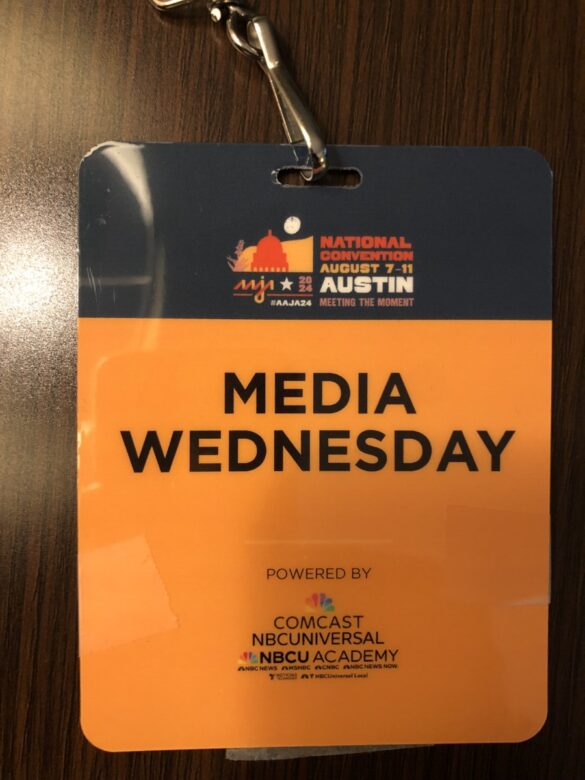 Journal-isms: AAJA Limits Media Coverage; Just 1 Signs Up (Aug.9, 2024) (scroll down)
Journal-isms: AAJA Limits Media Coverage; Just 1 Signs Up (Aug.9, 2024) (scroll down)
- June 15 update: SPJ-D.C.: Hall of Fame Inductees Discuss Respect, the Strength of Words and Press Freedom Threats
- SPJ DC: Stephenie Overman on receiving the Distinguished Service Award. (video)
- Diane Sylvester, Editor & Publisher: 50 years of advocacy and impact: Celebrating NABJ’s enduring legacy
House Votes to Cut Public Broadcasting Funds
“The House approved the Trump administration’s $9.4 billion rescission package that includes CPB [Corporation for Public Broadcasting] funding, advancing the measure to the Senate,” Austin Fuller reported Thursday for Current, the publication for public broadcasting.
“The package passed 214-212, with four Republicans voting against it.
“President Trump proposed clawing back $535 million in CPB’s forward-funded appropriations for fiscal years 2026 and 2027 as part of the package.
“The rescissions now need a simple majority in the Senate, not the 60 votes needed to break a filibuster. Debate on a rescission bill is limited to 10 hours, according to the research nonprofit Brookings Institution.
“In a statement after the vote, America’s Public Television Stations President and CEO Kate Riley said local stations will bear the brunt of the CPB rescission.
“ ‘This destructive rescission of Corporation for Public Broadcasting … funding — the substantial majority of which goes to local stations — will result in immediate and serious cuts of stations’ local services and in some cases the total closure of stations, particularly in rural communities,’ Riley said.
“Trump sent his rescission package to Congress on June 3. It includes cuts to foreign aid programs, which lawmakers debated along with the potential impact of eliminating public media’s federal funding on Thursday. Democrats brought up children programming and public broadcasting’s value to public safety, while Republicans cited bias in public media. . . .”
- Jill Abramson, Boston Globe: Do we really need two public radio stations in Boston?
- Protect My Public Media: Urge Congress: Save Public Media
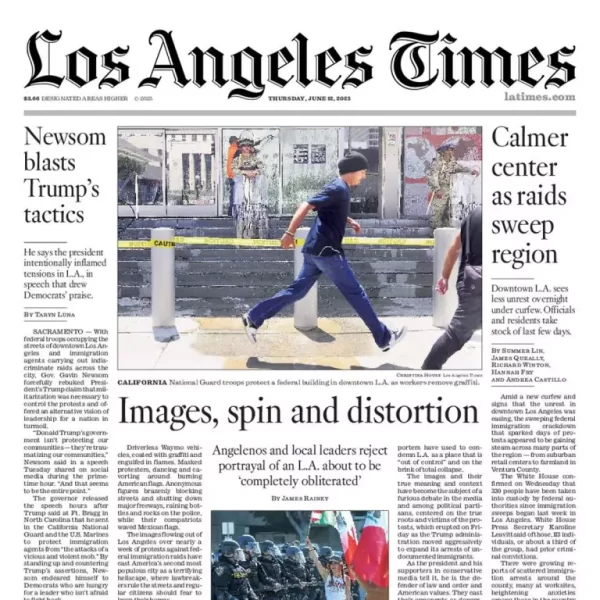

Front page of the print edition of Thursday’s Los Angeles TImes, and a Friday extra.
Press Groups Blast Attacks on Journos in L.A.
- Update: Kyle Cheney and Josh Gerstein, Politico: Appeals court lets Trump keep National Guard in Los Angeles
“Jason Carroll, a CNN reporter reporting on the unrest on the streets of LA, was led away by officers on Monday night with his hands held behind his back, even though he apparently identified himself as a journalist,” Benedict Smith reported Wednesday for Britain’s the Telegraph under the headline, “LA police shot my photographer in the head.”
“ ‘I’m being detained… I’m not being arrested, correct officers?’ he could be heard saying, as he was taken outside a security perimeter.
“Mr Carroll, who appears to have been detained for under 30 seconds, said the incident was unusual because police normally ‘realise that the press is there doing a job’.
“ ‘You take a lot of risks as press – this is low on that sort of scale of risks. But it is something that I wasn‘t expecting, simply because we’ve been out here all day,’ he said.
“CNN said two of its security personnel were also briefly detained by the police before being released without charge.
“Several journalists were shot by officers using non-lethal rounds as they covered the protests in the last few days, including Nick Stern, a British photographer, The New York Post’s Toby Canham, Lauren Tomasi, an Australian TV reporter, and The Telegraph’s Jon Putman.
“Anthony Albanese, the Australian prime minister, described Ms Tomasi’s experience as ‘horrific’ and said he had raised the issue with the US government. . . .”
Such incidents prompted a coalition of press freedom and media organizations led by the First Amendment Coalition, Freedom of the Press Foundation, and Los Angeles Press Club, to sign a letter condemning attacks on journalists covering immigration protests in the Los Angeles area:
“We are deeply alarmed by reports that federal and local law enforcement officers used force, including rubber bullets and chemical munitions, that caused injuries to members of the press. As the letter notes, federal officers appear to have targeted journalists who were simply doing their jobs,” PEN America reported Monday.
“Several reporters were injured, including by rubber bullets, while covering the protests. Others faced barriers to access that prevented them from reporting freely due to law enforcement actions. According to Reporters Without Borders and the Los Angeles Press Club, at least 27 attacks on journalists covering protests in Los Angeles took place between June 6 and June 8.”
- Zeeshan Aleem, MSNBC: Trump’s security theater in L.A. comes with a 9-digit price tag
- Zeeshan Aleem, MSNBC: The insidious subtext of Trump’s L.A. ‘insurrection’ narrative: It was Trump, not the protesters, who escalated the crisis in Los Angeles.
- Perry Bacon Jr., Washington Post: Sending the National Guard is bad. Arresting 3,000 a day is worse.
- Liz Courquet-Lesaulnier, Word In Black: Justice vs. ‘Just Us’: Should Black People Care About ICE?
- First Amendment Coalition: A letter to Kristi Noem: The targeting of reporters in LA is inexcusable.
- Karen Garcia, Howard Blume, Nathan Solis, James Queally and Julia Wick, Los Angeles Times: All of L.A. is not a ‘war zone.’ We separate facts from spin and disinformation amid immigration raids
- Marcela García, Boston Globe: LA stands up to ICE raids. What about Boston?
- Renee Graham, Boston Globe: Is Trump’s troop deployment in LA a prelude to martial law?
- Steve Lopez, Los Angeles Times: Why this overheated invasion of L.A. looks so ugly and feels so personal
- Los Angeles Sentinel: Bryan Decries Immigration Raids in Culver City and Los Angeles
- Adam Mahoney, Capital B: For Some Black Angelenos, ICE Raids Reopen the Wound of Displacement
- Shade Burgs, Black Iowa News: ICE raids — same song, different beat
- Roy S. Johnson, al.com: Trump will unleash troops on you, too
- Reporters Without Borders: USA: RSF condemns wave of violence against journalists covering Los Angeles protests
- Saffiyah Riddle, Charlotte Kramon, & Matt Brown, Associated Press and Report for America: National Guard troops in LA mark latest in long history of deployments during civil rights protests
- Adam Rose, Bluesky: Law enforcement is violently targeting press at protests around Los Angeles, from easily recognizable “mainstream” outlets to freelancers and independents.
CNN’s Sara Sidner and Stephanie Elam share an emotional tribute about their friend on CNN. (Credit: YouTube)
‘Cultural Mainstay’ Ananda Lewis Dies of Breast Cancer
The “media world is mourning the loss of Ananda Lewis, a former media powerhouse and activist who made space for Black girls to be smart, stylish, and unapologetically themselves on screen,“ Haniyah Philogene reported Thursday for theGrio. “As previously reported by theGrio, Lewis had been battling breast cancer for years, and on June 11, her family confirmed that she passed away at 52.
“ ‘I loved hard and lived loud and didn’t back away from problems,’ Lewis told Kelley Carter in 2024 when asked how she wanted to be remembered. ‘[That I] loved this life and was okay with letting it go, too. It’s a temporary situation, so do your best; that’s all we’re all doing is our best.’
“And her love and the legacy she built with it will certainly be remembered. Lewis was a cultural mainstay, offering a blueprint for what it meant to shine in front of the camera without compromising your values. Her rise from ‘Teen Summit’ to MTV to outspoken advocate showed a generation of Black viewers that media could be a place where we not only existed but thrived.
“ ‘Ananda Lewis was really a media blueprint in so many ways— on-air correspondent, host, model, activist. She was the informed It Girl of her era. Such an inspiration,’ one user tweeted.
“Tributes have been pouring in not just from fans, but from her inner circle and peers across industries. . . .”
Michael Bolden discussed his Alabama upbringing and his commitment to democracy in this interview for “Democracy Day” in 2022. (Credit: YouTube)
Michael Bolden Named Dean of Berkeley J-School
Michael Bolden, a committed diversity advocate who has worked for journalists to become closer to the communities they cover, has been named dean of the UC Berkeley Graduate School of Journalism, effective Aug. 1, the university announced Tuesday.
“You have to know your community, be part of your community, and not be afraid to say you love your community,” Bolden has said.
Bolden, 55, will join a growing number of Black deans of majority-white journalism schools, including Battinto Batts Jr. at Arizona State University, Hub Brown at the University of Florida, Jelani Cobb at Columbia University, Kenn Gaither at Elon Univesity, Marnel Niles Goins at American University, Sheryl Kennedy Haydel at Loyola University New Orleans and Charles Whitaker at Northwestern University.
“Currently the CEO and Executive Director of the American Press Institute (API), Bolden has had a distinguished career that has taken him from the New Orleans Times-Picayune to the Washington Post and San Francisco Chronicle, the John S. Knight Fellowship program at Stanford University and API,” the announcement said. “He has worked as a local reporter and national editor, a teacher and nonprofit leader.
“At the San Francisco Chronicle, as director of culture and operations, one of the organization’s masthead editors, he helped the newsroom respond to online harassment and abuse. During the pandemic, he co-developed a new remote John S. Knight Journalism Fellowship at Stanford University to improve how journalists serve communities of color.
“At API, Bolden updated the organization’s focus toward inclusion, civic discourse, community engagement and newsroom sustainability to address the urgent needs of a changing field. He will depart API in mid-July. . . .
“Bolden says that when he thinks about today’s threats to journalism, democracy and the rule of law, he thinks about his parents living in the Deep South in Alabama during the Jim Crow era and recalls the sacrifices they made and the strength they demonstrated. About his father, he said: ‘Whether it was walking through a back door, drinking out of separate fountains or being called “boy” — everything that he and his generation endured, none of what we face now is greater than what they faced.’
“He says that as a Black gay man, he has faced assaults on his own humanity as well.
“ ‘All of that has shaped my experience, and I think has made me more human and more empathetic,’ Bolden said. ‘I am someone who has felt deeply and who feels deeply for people. That is rooted in my own experience ‘.”
“After their bodies were dismembered over a century ago and their skulls sent to Germany in racially-biased phrenology research, the remains of 19 African Americans have been returned to New Orleans for a proper send off,” the Associated Press reported in this video. (Caption: Associated Press/YouTube)
Atrocities Against Blacks Aired in U.S., Abroad
Kudos to the news organizations that, in this time of efforts to suppress Black history, have reported on events commemorating atrocities against Black people at home and abroad.
In New Orleans, a multi-faith memorial took place at the end of May, laying to rest in a jazz funeral the skulls of 19 patients now repatriated to Louisiana after more than a century overseas.
The patients “died at one New Orleans hospital in the 1870s,” and their “heads were removed by a doctor to be sent to Germany. There, the crania were studied as ‘specimens’ in what was then a proliferating pseudoscience of phrenology. It purported connections between someone’s intellect or morality and the size or shape of their skull, with some doctors theorizing superiority of one race over another,” as NPR’s Alina Selyukh reported May 31.
Stacy M. Brown wrote for BlackPressUSA, news service for the National Newspaper Publishers Association, ” ‘This was not just an act of remembrance,” Dr. Eva Baham, chair of the Repatriation Committee and former Dillard [University] professor, said during an appearance on Black Press USA’s Let It Be Known News morning show. ‘It was a restoration of humanity.’ ”
Will Sutton wrote June 6 for NOLA.com, “What happened to The Nineteen was in the 1800s, but disdain, disrespect and exploitation of Black people — specifically Black bodies — has continued.
“In the 1800s and the 1900s some regularly stole Black bodies from graveyards and sold them — in whole or in parts — to the highest bidding medical schools.”
Sutton then mentioned the infamous 40-year “Tuskegee Study of Untreated Syphilis in the Negro Male,” and in 1951, the exploitation of Henrietta Lacks, a Black woman who was diagnosed with cervical cancer at Johns Hopkins University in Baltimore. “Somebody thought taking some of her cell samples was a good idea,” Sutton continued.
“Lacks’ cells helped the development of a polio vaccine, aided cancer research and helped with gene mapping. Unfortunately, no one asked Lacks or her family. Companies made millions. Lacks and her family did not — until Thermo Fisher Scientific Inc. settled a lawsuit with Lacks’ heirs — in 2023.”
In May 2021, Germany “formally acknowledged responsibility for the colonial-era genocide against Namibia’s Herero and Nama peoples more than 100 years ago,” Al Jazeera reported after the acknowlegment . . . “But Herero and Nama activists, who have long campaigned for reparations, say the compensation offer does not truly reflect the appalling suffering of the tens of thousands who died — through ethnic cleansing, disease, starvation, imprisonment and torture. In ‘Namibia: The Price of Genocide,’ filmmakers Naashon Zalk and Hamilton Wende have been finding out why.“ (Credit: YouTube)
. . . In Namibia, Recalling 20th Century’s First Genocide
“Dubbed ‘Germany’s forgotten genocide’, and described by historians as the first genocide of the 20th Century, the systematic murder of more than 70,000 Africans is being marked with a national day of remembrance for the first time in Namibia, in southwestern Africa,” Natasha Booty reported May 28 for the BBC.
“Almost 40 years before their use in the Holocaust, concentration camps and pseudoscientific experiments were used by German officials to torture and kill people in what was then called South West Africa.
“The victims, primarily from the Ovaherero and Nama communities, were targeted because they refused to let the colonisers take their land and cattle.”
In the Windhoek Observer in that country, Prof. Dr. Job Shipululo Amupanda, a member of the Namibian Parliament, wrote, ” In the 20th century, white people and Europeans drew what Frantz Fanon called ‘the line of the human’. This line divided human beings into two zones – the zone of being and the zone of non-being.
“Whites and Europeans were hitherto located in the zone of being. The rest of humanity in general, and the blacks and non-whites in particular, were located in the zone of non-being. Only the lives of those in the zone of being mattered. . . .”
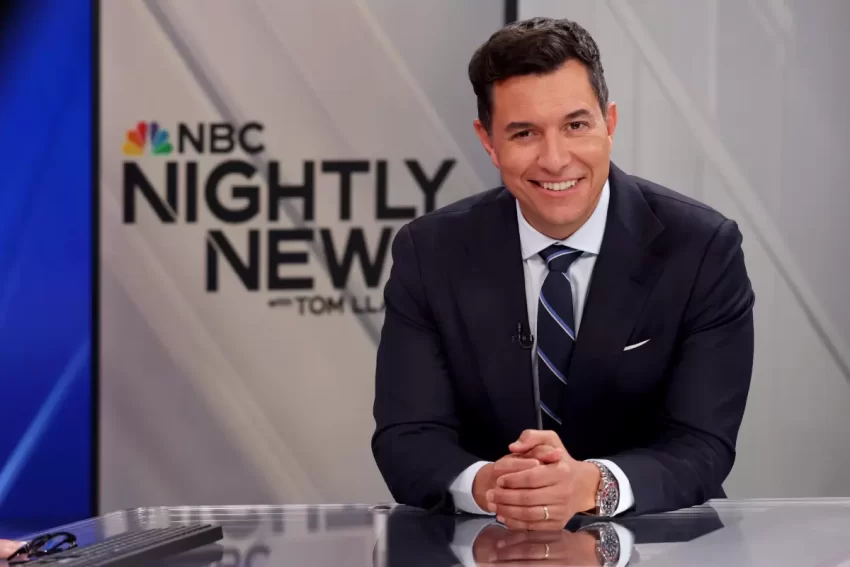
Tom Llamas told the Los Angeles Times that Lester Holt advised him, “ ‘Your life is going to change.’ And he explained to me that everyone’s going to want a piece of you and there’s going to be a lot of demands, even more than you’ve ever experienced. And he’s been right about that. He said, ‘You have to make the right decisions when it comes to your career and your family.’ ” (Credit: Genaro Molina/Los Angeles Times)
Llamas’ Ratings Not Yet Matching Holt’s
“NBC Nightly News’ took a minor ratings hit as new host Tom Llamas replaced veteran anchor Lester Holt last week, according to Nielsen data out Tuesday,” Sean Burch reported Tuesday for The Wrap.
“For the week of June 2, ‘Nightly News’ averaged 5.45 million viewers, which was down 4.7% compared to the week prior, when Holt averaged 5.72 million viewers as he wrapped up his decade in the anchor chair. . . .
“As is usually the case, NBC’s evening newscast came in second place to David Muir’s ‘ABC World News Tonight’ last week. Muir averaged 7 million viewers in his first week facing off against Llamas, which was flat compared to the week prior.
“ ‘CBS Evening News,’ co-hosted by Maurice DuBois and John Dickerson, averaged 3.90 million viewers last week. Comparing to the same period a year prior, ABC’s ratings were down 1% and CBS Evening News was down 8%. . . .”
Llamas, the son of Cuban immigrants, becomes the first Latino to anchor a daily English-language network evening newscast.
For the Los Angeles Times, media writer Stephen Battaglio said to Llamas June 1, “President Trump basically declared war on diversity, equity and inclusion policies. [The Federal Communications Commission has called for an investigation into NBC’s parent firm Comcast for what it describes as ‘DEI discrimination.’] Has that muted the achievement of being the first Latino to anchor an English-speaking nightly newscast?”
Llamas replied, “I don’t think I got this job because I’m Hispanic; I think I got this job because I’m the best person for the job. And I know that’s what NBC believes, too. My life story is something I’m very proud of. (My parents) essentially came to this country with nothing. They had no money, they barely spoke the language, and this incredible country gave them a second chance. It gave them a new home. And they taught me hard work, but they also taught me to love this country. And I do, I think this is the greatest place in the world, hands down. To become the anchor of ‘Nightly News’ tells me that the American dream is still very alive.”
Battaglio also wrote, “Llamas, 45, takes over for Lester Holt, who will move full time to NBC’s ‘Dateline’ after a 10-year run in the anchor chair. . . .”
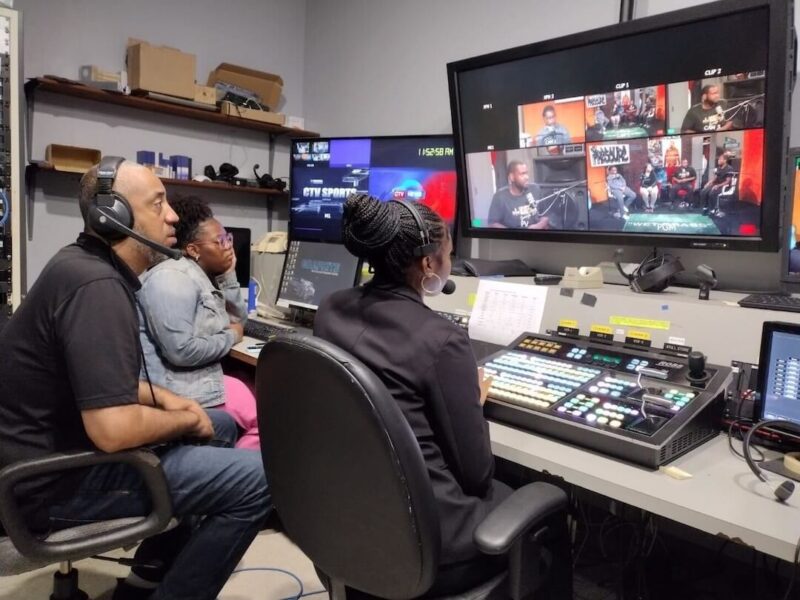
Prince George’s Community Television production assistant Bryan Young with interns in the control room. (Courtesy via the Poynter Institute)
D.C.’s NABJ Chapter Helps Save Community TV
“The campaign to save Prince George’s Community Television culminated at a two-hour-long county budget hearing, where 37 people wearing ‘Save CTV’ pins implored their county council to save the station,” Sophie Endrud reported Wednesday for the Poynter Institute, referring to the Washington, D.C., suburb of Prince George’s County, Md.
Prince George’s is 62.9 percent Black and 22.8 percent Hispanic or Latino, according to 2024 Census figures.
“Reporter Mikayla Newton reached out to the Washington Association of Black Journalists in late April for support,” Endrud continued. “WABJ promoted the ‘Save CTV’ petition, which reached more than 400 signatures. A Washington Post article gave the station more exposure. An hour before the hearing, reporters and fans gathered outside the county administration building to chant their support.”
And in a rare move for a chapter of a journalists-of-color association or for the National Association of Black Journalists itself, WABJ testified before a government agency, the county council.
 “Still, the staff braced for the worst. WABJ President Philip Lewis (pictured) recalled reporters telling him they were preparing to lose their jobs.
“Still, the staff braced for the worst. WABJ President Philip Lewis (pictured) recalled reporters telling him they were preparing to lose their jobs.
“ ‘I think when you look at news, sometimes it can be hard for people to understand the value of it until it’s too late,’ Lewis said.
“Instead, the Prince George’s County Council listened to another young CTV volunteer’s plea from the hearing: ‘Do not be complicit in silencing the media in 2025.’
“The County Council’s announcement came on May 29. It decided to preserve funding for CTV. In the revised budget plan, the station will receive the same $924,600, now under the Park & Planning Department instead of the general operating budget. This will give CTV more protection against future cuts and might even grant the station more independence to expand on its programs. . . .”
Senior editor Daarel Burnette of the Chronicle of Higher Education explains DEI tracking efforts. (Credit: YouTube)
Accrediting Council, Black Press Change DEI Language
The accrediting council for college and university journalism programs has revised its language evaluating “diversity and inclusiveness” to one ranking “Advancing a Culturally Proficient Workforce,” while the association for Black-press publishers announced Wednesday that “ ‘Merit, Advancement, and Opportunity’ – or M.A.O. – will replace Diversity, Equity, and Inclusion (DEI) as the movement’s guiding language.”
Benjamin F. Chavis Jr., president and CEO of the National Newspaper Publishers Association, “said the DEI framework, once embraced as a path to equity, has been manipulated and weaponized by far-right forces to ‘undermine the progress of communities of color in America,‘ ” Stacy M. Brown reported for the association’s BlackPressUSA.
“In both public statements and a recent op-ed, Chavis outlined the logic behind replacing DEI with MAO. ‘Words matter,’ he wrote, recalling the backlash to affirmative action and critical race theory — terms that, like DEI, have been twisted into targets by conservative politicians and media. ‘In America today, it is time to move forward.’ ”
The Accrediting Council on Education in Journalism and Mass Communications, which accredits “programs in professional journalism and mass communications in institutions of higher learning,” voted to change its language on May 1.
The introduction to this accrediting standard now reads, “The unit demonstrates it offers a program that fosters equal opportunity, respect for a range of points of view and provides participatory opportunity for all elements of society while educating culturally proficient communicators prepared for a global society.
“The unit ensures that all individuals are treated fairly and with dignity, emphasizing shared values of professionalism, personal responsibility, and excellence. The unit focuses on empowering all individuals through equal access to opportunities and the promotion of skills, regardless of background or identity.”
- Richard Amesbury, Chronicle of Higher Education: What Is Replacing DEI? Racism. (June 5)
- Erin Gretzinger, Maggie Hicks, Christa Dutton and Jasper Smith, Chronicle of Higher Education: Tracking Higher Ed’s Dismantling of DEI
- Jasper Smith, Chronicle of Higher Education: Funding for Hispanic-Serving Institutions Is Discriminatory and Unconstitutional, Lawsuit Argues
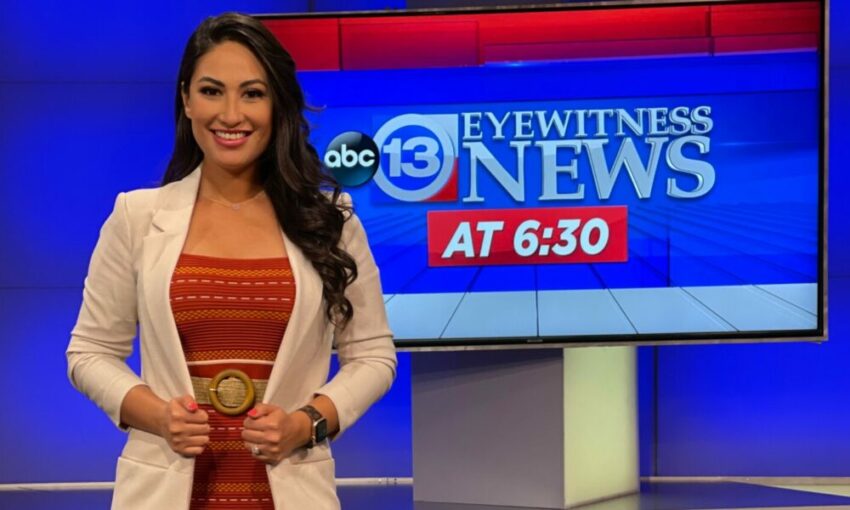
Mayra Moreno was born in Guanajuato, Mexico, and raised in Houston’s East End. “She’s a proud alum of the University of Houston, where she graduated Magna Cum Laude with a double major in Journalism and Spanish. Mayra loves being involved in the Hispanic community,” according to her bio.
Anchor Rebuffs Viewer on Use of ‘Buenas Noches’
“ABC 13 evening anchor Mayra Moreno is once again standing firm in her identity after facing criticism for using Spanish in her broadcasts,” Ariana Garcia reported Tuesday for the Houston Chronicle. “The veteran Houston journalist recently responded on Instagram to a viewer who took issue with her nightly sign-off, ‘Buenas Noches.’
“In an email, the viewer wrote: ‘I would like to make a suggestion. When you present the news in English you seem to feel we need to know your ethnicity by signing off “Buenas Noches.” I’m sure you know we have Spanish stations if you need to drop something in Spanish. If you speak in English throughout the show, why do you sign-off in Spanish? With all that’s going on with the Latinos, your sign-off sounds like you’re teasing the Hispanics. There’s no need for this kind of activity to go on.’
“Moreno didn’t stay silent. In a measured but powerful response, she called out the message as an example of racism she and other Latino journalists still face.
” ‘This is just one of the kind of messages I receive sometimes (I’ve been outspoken about these messages before and other #LatinosInTV who are their authentic self have shared the same type of racist messages),’ Moreno wrote.
“The phrase ‘Buenas Noches’ reflects Moreno’s background and how she connects with the community, she explained. ‘I say it with pride at the end of my newscast,’ she wrote. ‘It’s small, but meaningful to me. A simple way to share a piece of myself with the people I serve every night.’
“Reflecting on her own experiences growing up, Moreno shared that she once felt ashamed of her accent and background due to discrimination. Today, she takes pride in her culture and heritage. ‘I am proud of who I am,” she wrote. “Proud to be a reflection of my parents who are hardworking, bilingual, and full of corazón.’ . . .”
Veteran journalist Bobbi Bowman introduces Richard Prince Tuesday at the Washington, D.C., Pro Chapter of the Society of Professional Journalists’ 2025 Dateline Awards Dinner & Hall of Fame Ceremony. She noted that as young Black reporters at the Washington Post in 1972, the two were part of the Metro Seven, who filed a groundbreaking employment discrimination complaint against the paper. Citing changes made at the Post, she said, “We won!” (Credit: Shevry Lassiter)
‘The Respect Issue Extends Not Just to Those Marginalized in Newsrooms’
Richard Prince acceptance speech (video) at SPJ – DC Hall of Fame honors, June 10, 2025.
Good evening,
There’s a song by Burt Bacharach and Carole Bayer Sager called “Overnight Success,” sung by Gladys Knight and the Pips. At one point, Gladys declares, “I worked hard for my respect!”
It always strikes a chord because that’s the way many marginalized people feel.
I’m not talking about the Rodney Dangerfield kind of respect, for those old enough to remember that Ed Sullivan-era comedian. (“I don’t get no respect!”)
I’m referring to the kind that is deeply rooted in the history of this country and others.
Supreme Court Chief Justice Roger B. Taney said in the Dred Scott decision of 1857 that Black people “had no rights which the white man was bound to respect.”
Today this attitude is manifested in the disrespect for other people’s history and viewpoints — witness the attacks on Black history, on DEI, even the removal of books from military libraries that deal with people who are not white men. Some women can tell you about how their views around the conference table are often ignored until a man says the same thing.
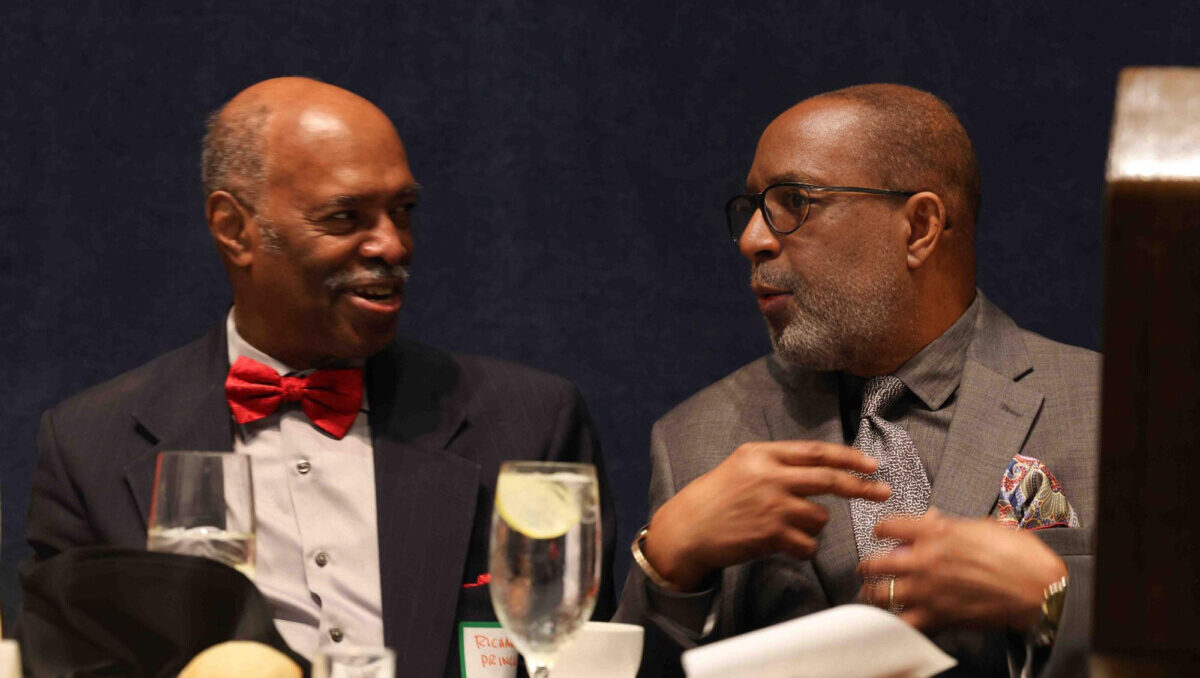 I feel this in my own work. Dori Maynard of the Maynard Institute for Journalism Education launched the online version of Journal-isms because the media columns of the day were not addressing issues of diversity nor reporting sufficiently on journalists of color. While that was in 2002, it’s still pretty much the case. I can break a story about people of color or diversity and it’s like shouting in the wilderness in many media-writing circles. (Photo: With Kojo Nnamdi, at right, master of ceremonies and host of WAMU Radio’s The Politics Hour, by Shevry Lassiter.)
I feel this in my own work. Dori Maynard of the Maynard Institute for Journalism Education launched the online version of Journal-isms because the media columns of the day were not addressing issues of diversity nor reporting sufficiently on journalists of color. While that was in 2002, it’s still pretty much the case. I can break a story about people of color or diversity and it’s like shouting in the wilderness in many media-writing circles. (Photo: With Kojo Nnamdi, at right, master of ceremonies and host of WAMU Radio’s The Politics Hour, by Shevry Lassiter.)
I’ve spent more time than I care to, lobbying for obituaries of Black journalists to be included in the daily news report.
One distinguished reader, when I mentioned the subject of my remarks tonight, replied, “Maybe wrapped into the matter of respect is just having enough basic curiosity and human decency to actually want to know about communities other than one’s own and people different from one’s personal circle. Supposedly that is a key to being a good journalist.. . .”
This lack of respect is backed up by research. One study released in February, “Integrated Newsrooms: An Examination of Workplace Satisfaction for Black Journalists,” reported “that job satisfaction for Black journalists is linked to appreciation, competitive salaries, and newsroom innovation — not just diversity initiatives. The authors acknowledge that such factors for job satisfaction are likely to apply to journalists of all races and backgrounds, but that Black journalists may experience these things differently as well.”
And indeed, many respondents reported feeling isolated, facing exclusionary behaviors, and encountering structural limitations in career advancement. Overall, 50% of the journalists surveyed said they had experienced racism at work. As one respondent put it bluntly: “Newsrooms are still not diverse enough. … We are sitting at the table in greater numbers but are expected just to shut up and eat, so to speak.”
I don’t mean to be gloomy. While I’ve had one editor throw into the trash a souvenir I brought back from a conference in which I received an award, I had another, a female editor new to the job, bend down and tie my shoelaces. I didn’t know what to think. Another got on her knees to meet me at eye level to explain why she was rejecting the piece I’d written.
And of course the respect issue extends not just to those marginalized in newsrooms. The marginalized even do it to each other. Last year, the National Association of HIspanic Journalists and Asian American Journalists Association decided that working media writers could receive press passes for their four-or five-day conventions for only one day, then had to pay full-freight registration costs. “The reason for the policy is that virtually all convention attendees are working journalists engaging with the sessions in a professional capacity,” the P.R. person serving both organizations told me.
Don’t be surprised if I’m not there this year.
Yes, “Respect.” Aretha Franklin’s version of that song helped push the women’s movement forward. But the Staple Singers also had a hit song called “Respect Yourself.”
Applied to journalists, that means refusing to kowtow to orders that mean you compromise your journalistic principles, as happened this year with Wendy McMahon, now former president and CEO of CBS News, and Bill Owens, the now former executive producer of “60 Minutes.” It means that if you’re hosting the White House Correspondents’ Dinner, as Eugene Daniels did this year, that even when the president of the United States breaks with precedent and won’t join you, and you take flak for canceling the comedian you had scheduled, you make a ringing defense of the rights of journalists to operate free of White House retaliation over their editorial choices.
Such as the AP’s decision not to change its style to call the Gulf of Mexico “the Gulf of America.”
You are not respecting yourself as a journalist, though, when, as the journalism component of one historically Black college is doing, you travel to a country such as Cuba, where journalists and protesters are thrown in jail for expressing their views, and not say a word about it, instead joining the regime in denouncing the United States. Nor are others respecting themselves when they fail to report on this conduct.
I want to close with some words we should remember from Kathleen Carroll, former board chair of the Committee to Protect Journalists and formerly executive editor and senior vice president at the Associated Press.
When I told her I wanted to address the subject of press freedom in these remarks, she wrote back, “For the First Amendment to get the attention it deserves from average citizens, we need to do a better job of reminding people what it protects. Their rights.
“People have the impression we’re arguing for protecting our jobs/a profession. That’s not it at all, of course. It’s about their rights to say things, to gather, to pray, to ask questions, without the government using its power to punish them. It’s pretty clear cut.”
Thank you for the respect, not just for me, but for those I represent and write about.
- Journal-isms: Save the Date – June 21 for Journal-isms’ First Fund-Raiser/ Sweet Honey In The Rock (May 25)
- SPJ- Washington, D.C.: 2025 Hall of Fame and Dateline Awards dinner applauds journalism excellence in the D.C. region, celebrates distinguished honorees
[btnsx id=”5768″]
To subscribe at no cost, please send an email to journal-isms+subscribe@groups.io and say who you are.
Facebook users: “Like” “Richard Prince’s Journal-isms” on Facebook.
Follow Richard Prince on Twitter @princeeditor
Richard Prince’s Journal-isms originates from Washington. It began in print before most of us knew what the internet was, and it would like to be referred to as a “column.” Any views expressed in the column are those of the person or organization quoted and not those of any other entity. Send tips, comments and concerns to Richard Prince at journal-isms+owner@
View previous columns (after Feb. 13, 2016).
View previous columns (before Feb. 13, 2016)
- “Black Journalists Will Figure in Jimmy Carter’s Legacy” on Sirius XM’s “Urban View Mornings.” (video) (Jan. 3, 2025)
- Diversity’s Greatest Hits, 2018 (Jan. 4, 2019)
- Book Notes: Is Taking a Knee Really All That? (Dec. 20, 2018)
- Book Notes: Challenging ’45’ and Proudly Telling the Story (Dec. 18, 2018)
- Book Notes: Get Down With the Legends! (Dec. 11, 2018)
- Journalist Richard Prince w/Joe Madison (Sirius XM, April 18, 2018) (podcast)
- Richard Prince (journalist) (Wikipedia entry)
- February 2018 Podcast: Richard “Dick” Prince on the need for newsroom diversity (Gabriel Greschler, Student Press Law Center, Feb. 26, 2018)
- Diversity’s Greatest Hits, 2017 — Where Will They Take Us in the Year Ahead?
- An advocate for diversity in the media is still pressing for representation, (Courtland Milloy, Washington Post, Nov. 28, 2017)
- Morgan Global Journalism Review: Journal-isms Journeys On (Aug. 31, 2017)
- Journal-isms’ Richard Prince Wants Your Ideas (FishbowlDC, Feb. 26, 2016)
Richard Prince with Charlayne Hunter-Gault, “PBS NewsHour,” “What stagnant diversity means for America’s newsrooms” (Dec. 15, 2015)
- Book Notes: Journalists Follow Their Passions
- Book Notes: Journalists Who Rocked Their World

